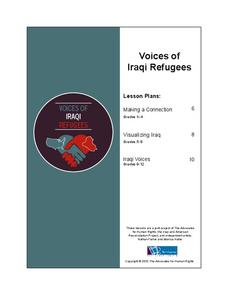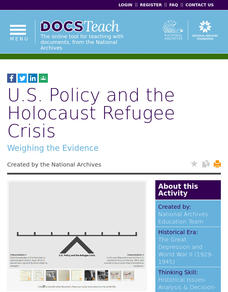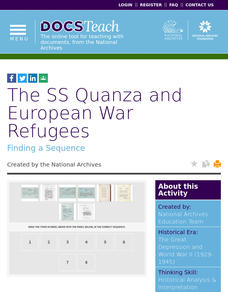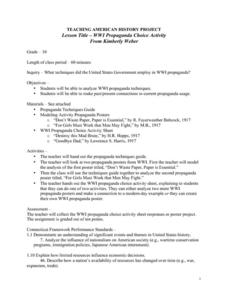University of Texas
Understanding Migration
Human migration—often the result of push and pull factors—sometimes has dramatic outcomes for both those leaving their homelands and the host countries. Using a variety of case studies, learners consider those issues. Then, by completing...
Global Oneness Project
Highways and Change
What is the cost of change? Roberto Guerra's photo essay "La Carretera: Life and Change Along Peru's Interoceanic Highway" asks viewers to consider the impacts of the 1,600 mile-long highway through Peru and Brazil that connects Pacific...
NET Foundation for Television
1850-1874 Homestead Act Signed: Who were the Settlers?
Life in the great, wide-open spaces of the West! Scholars analyze the reasons behind the vast movement to the Great Plains after the passing of the Kansas-Nebraska Act and the Homestead Act. Using photographic, document, map, video, and...
Advocates for Human Rights
Voices of Iraqi Refugees
The stated goal of this resource is to provide learners with basic facts about and build empathy for Iraqi refugees. To do so elementary classes develop a plan for how to welcome refugees to their classroom. Middle schoolers read...
DocsTeach
U.S. Policy and the Holocaust Refugee Crisis
How did the United States respond to the Holocaust refugee crisis during World War II? The activity focuses on the United States' foreign policies and the arguments for and against offering assistance. Scholars analyze historical...
DocsTeach
The SS Quanza and European War Refugees
World War II not only resulted in major loss of life, but it also displaced thousands of people. An eye-opening activity uses primary documents to explore the refugee crisis during World War II. Scholars compare the event to modern-day...
Angel Island Immigration Station Foundation
Interview a Family or Community Member: Taking Oral Histories
Young scholars gain insight into how historians record events by engaging in an oral history project. In preparation, class members brainstorm open-ended interview questions and take part in and debrief a mock interview simulation....
University of Arkansas
Promises Denied
"Promises Denied," the second instructional activity in a unit that asks learners to consider the responsibilities individuals have to uphold human rights, looks at documents that illustrate the difficulty the US has had trying to live...
Curated OER
Constructing Narrative from the Migrant Experience in Literature
Excerpts from John Steinbeck's The Grapes of Wrath and from John Fante's Ask the Dust, as well as a variety of primary source documents provide the background for an examination of the migrant experience from 1920-1945.
Curated OER
WWI Propaganda Choice Activity
World War I propaganda techniques employed by the United States government are the focus of this lesson plan. The resource includes an excellent handout of propaganda techniques, ranging from appealing to authority to repetition, lying,...
Roy Rosenzweig Center for History and New Media
The Homestead Act
To understand how the Homestead Act of 1862 changed the US and the lives of the people during that time, class members examine primary source materials including letters, broadsides, and images. They then assume the voice of a...
Constitutional Rights Foundation
Naturalized Citizens and the Presidency
Article II, Section 1 of the U.S. Constitution takes center stage in a lesson that asks class members to assume the role of state senators, debate a resolution to amend the U. S. Constitution to permit naturalized citizens to run for...
Alabama Department of Archives and History
Marketing a Bad Idea: Why So Many People Joined the Klan in the 1920s
How did the Klu Klux Klan manage to gain so many members during the 1920s? Class members examine Klan documents and promotional materials to gain an understanding of the propaganda techniques used to attract members.
Other popular searches
- American Immigration 1800's
- Central American Immigration
- American Immigration Laws
- Latin American Immigration
- American Immigration 1800'2
- African American Immigration
- American Immigration 1800s
- American Immigration Unit Plan














